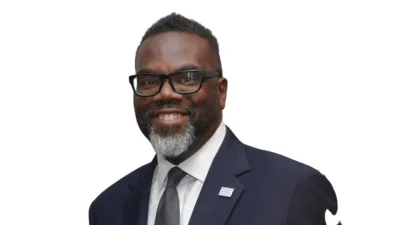Timothy Jackson, AFC director of government relations | aidschicago.org
Timothy Jackson, AFC director of government relations | aidschicago.org
Medicaid is vital to over half the number of persons living with HIV in the state. Timothy Jackson, director of government relations at the AIDS Foundation of Chicago, stressed this during the recent signing of the Medicaid omnibus bill.
Senate Bill 2294 will allow Medicaid coverage for “federally approved tobacco cessation medications and for tobacco cessation counseling services and medications provided through the Illinois Tobacco Quitline.” Jackson explained this is critical health care for persons living with HIV.
“I'm here representing the AIDS Foundation of Chicago but more importantly people living with or vulnerable to HIV here in Illinois,” Jackson said. “Senate Bill 2294 is a major win for the state's Medicaid program and for the most vulnerable communities across our state. As we've seen with the COVID-19 pandemic, access to healthcare is paramount. That is also true for people living with HIV.”
Jackson stated that vulnerable communities rely on Medicaid.
“Three out of every five people living with HIV in Illinois receive their health care through the Medicaid program,” he said. “While there are a number of reforms included in this legislation worth mentioning I did want to highlight one: smoking cessation. Senate Bill 2294 extends Medicaid coverage for all tobacco cessation medications and counseling services. Smoking is especially dangerous for people living with HIV, for people living with HIV taking treatment with an undetectable viral load, smoking has a much greater impact on life expectancy than the HIV itself.”
Smoking raises the risk for heart problems, pneumonia, and other diseases in people with living with HIV.
“[It] can shorten the life expectancy of a person living with HIV by an average of 6 years and it doubles the risk for death for people living with HIV who are taking HIV treatment,” Jackson said. “This bill goes a long way in assisting us to fulfill the goals and priorities of the Getting to Zero Illinois 2030 plan to end HIV, and so we understand that this is just very common-sense bipartisan bicameral legislation to help the most vulnerable in our communities.”
The Illinois Certified Community Behavioral Health Clinics Act took effect upon becoming a law.
Approximately there were 39,842 people living with HIV in Illinois, in 2017.
In 2019 Gov. J.B. Pritzker, the Illinois Department of Public Health (IDPH), the Chicago Department of Public Health (CDPH), and the AIDS Foundation of Chicago (AFC) introduced Getting to Zero Illinois (GTZ-IL), a five-year comprehensive plan that details actions to end the HIV epidemic in Illinois by 2030.






 Alerts Sign-up
Alerts Sign-up